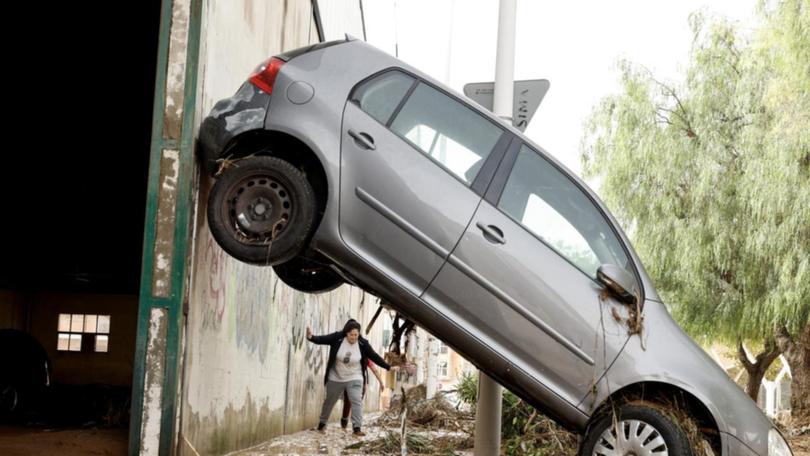Valencia floods: Spain faces deadliest flood in decades as death toll rises to 95, year of rain falls in a day

At least 95 people have been killed in the deadliest flooding to hit Spain for three decades after torrential rain battered the eastern region of Valencia, sweeping away bridges and buildings, local authorities said.
Meteorologists said a year’s rain had fallen in eight hours in parts of Valencia on Tuesday, causing pile-ups on highways and submerging farmland in a region that produces two-thirds of the citrus fruit grown in Spain, a leading global exporter.
Residents in the worst-hit places described seeing people clambering onto the roofs of their cars as a churning tide of brown water gushed through the streets, uprooting trees and dragging away chunks of masonry from buildings.
Sign up to The Nightly's newsletters.
Get the first look at the digital newspaper, curated daily stories and breaking headlines delivered to your inbox.
By continuing you agree to our Terms and Privacy Policy.“It’s a river that came through,” said Denis Hlavaty, who waited for rescue on a ledge in the petrol station where he works in the regional capital.
“The doors were torn away and I spent the night there, surrounded by water that was two metres deep.”
Spain’s minister of regional affairs, Angel Victor Torres, told reporters the authorities were still unable to give a final number for all those still missing, suggesting the death toll was likely to rise further.
“This shows the tremendous magnitude of this tragedy,” he said.
Prime Minister Pedro Sanchez promised to rebuild infrastructure that had been destroyed and said in a televised address on Wednesday: “For those who at this moment are still looking for their loved ones, the whole of Spain weeps with you.”
Footage shot by emergency services from a helicopter showed bridges that had collapsed and cars and trucks piled on top of each other on highways between flooded fields outside the city of Valencia.
Trains to the cities of Madrid and Barcelona were cancelled due to the flooding, and schools and other essential services were suspended in the worst-hit areas, officials said.
Power company i-DE, owned by Europe’s biggest utility, Iberdrola, said about 150,000 clients in Valencia had no electricity.
Emergency services in the region urged citizens to avoid all road travel and to follow further official advice, and a military unit specialised in rescue operations was deployed in some places to help local emergency workers.
Some parts of Valencia such as the towns of Turis, Chiva or Bunol recorded more than 400 mm of rainfall, leading the state weather agency AEMET to declare a red alert on Tuesday. It was lowered to amber on Wednesday as the rain eased.
There was also flooding in other parts of the country, including the southern region of Andalusia, and forecasters warned of more bad weather ahead as the storm moved in a northeasterly direction.
The regional weather service in Catalonia issued a red alert for the area around Barcelona, warning of high winds and hail, while the AEMET state agency placed the city of Jerez in Andalusia on red alert.
“(The floodwaters) took away lots of dogs, lots of horses, they took away everything,” said Antonio Carmona, a construction worker and resident of Alora in the southern region.
The death toll appeared to be the worst in Europe from flooding since 2021 when at least 185 people died in Germany.
It is the deadliest flood-related disaster in Spain since 1996, when 87 people died near a town in the Pyrenees mountains.
European Commission President Ursula von der Leyen said on X that Europe was ready to help.
“What we’re seeing in Spain is devastating,” she said on X.
ASAJA, one of Spain’s largest farmer groups, said on Tuesday it expected significant damage to crops.
Spain is the world’s largest exporter of fresh and dried oranges, according to trade data provider the Observatory of Economic Complexity, and Valencia accounts for about 60 per cent of the country’s citrus production, according to Valencian Institute of Agriculture Investigations.
Scientists say extreme weather events are becoming more frequent in Europe due to climate change. Meteorologists think the warming of the Mediterranean, which increases water evaporation, plays a key role in making torrential rains more severe.
“Events of this type, which used to occur many decades apart, are now becoming more frequent and their destructive capacity is greater,” said Ernesto Rodriguez Camino, senior state meteorologist and a member of the Spanish Meteorological Association.
